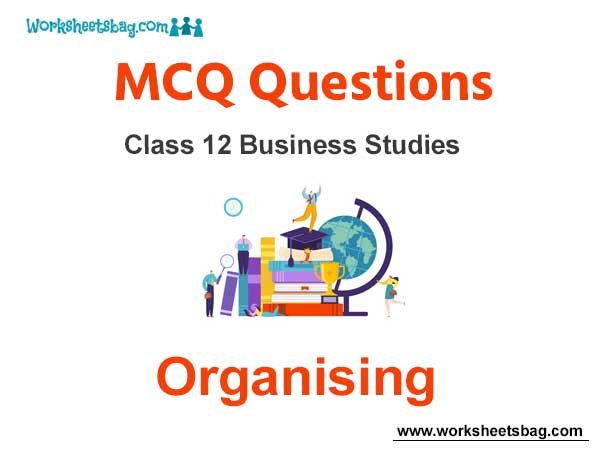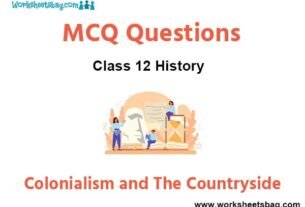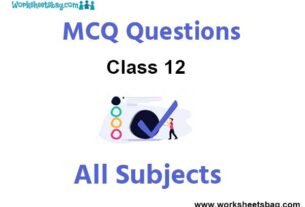Please refer to Organising MCQ Questions Class 12 Business Studies below. These MCQ questions for Class 12 Business Studies with answers have been designed as per the latest NCERT, CBSE books and syllabus issued for the current academic year. These objective questions for Organising will help you to prepare for the exams and get more marks.
Organising MCQ Questions Class 12 Business Studies
Please see solved MCQ Questions for Organising in Class 12 Business Studies. All questions and answers have been prepared by expert faculty of standard 12 based on latest examination guidelines.
MCQ Questions Class 12 Business Studies Organising
Question. The form of organisation known for giving rise to rumors is called
(a) Centralised organisation
(b) Decentralised organisation
(c) Informal organisation
(d) Formal organisation
Answer
B
Question. “Every step that increases the importance of the subordinates is called decentralisation and any step that decreases it is called centralisation”. What is it about?
(a) Formal organisation
(b) Informal organisation
(c) Both (a) and (b)
(d) None of these
Answer
D
Question. Span of management refers to
(a) Number of managers
(b) Length of term for which a manager is appointed
(c) Number of subordinates under a superior
(d) Number of members in top management
Answer
C
Question. Which of the following has a wider scope?
(a) Management
(b) Centralisation
(c) Decentralisation
(d) Delegation
Answer
A
Question. Which organisation structure is based on rules and procedures?
(a) Informal
(b) Formal
(c) Both (a) and (b)
(d) None
Answer
B
Question. Which of the following increases the importance of the subordinates?
(a) Centralisation
(b) Decentralisation
(c) Delegation
(d) Specialisation
Answer
B
Question. For delegation to be effective it is essential that responsibility be accompanied with necessary
(a) Authority
(b) Manpower
(c) Incentives
(d) Promotions
Answer
A
Question. Which structure of organisation is helpful in locating the inefficient employees?
(a) Formal
(b) Informal
(c) Both the above
(d) None of the above
Answer
A
Question. In which organisation structure do we find “group norms”?
(a) Formal
(b) Informal
(c) Both (a) and (b)
(d) None of these
Answer
B
Question. What is decentralisation?
(a) Short form of delegation
(b) Extended form of delegation
(c) Middle form of delegation
(d) None of these
Answer
B
Question. Which is not a feature of formal organisation:
(a) It is personal
(b) It is more stable
(c) It is deliberately created
(d) It is based on rules and procedures
Answer
A
Question. Which of the following is written in the organisation manual?
(a) Goods purchased
(b) Goods sold
(c) Meeting of Organisation
(d) Authority and responsibility of different posts
Answer
D
Question. Which of the following organisations lasts longer?
(a) Formal
(b) Divisional
(c) Both the above
(d) Informal
Answer
C
Question. ________ is more stable organisation.
(a) Formal
(b) Informal
(c) Both (a) and (b)
(d) None
Answer
A
Question. (I) Delegation of authority is inevitable and decentralisation is voluntary.
(II) Scope of delegation of authority is limited and the scope of decentralisation is broad.
Above both statement are:
(a) True
(b) False
(c) Statement (I) is True and Statement (II) is False
(d) Statement (I) is False and Statement (II) is True
Answer
A
Question. Which of the following is not an element of delegation?
(a) Accountability
(b) Authority
(c) Responsibility
(d) Informal organisation
Answer
D
Question. Which one of the following is not a part of process of organisation:
(a) Grouping of activities
(b) Doing complete centralisation
(c) Defining inter-relationship
(d) Knowing the objectives of enterprise
Answer
B
Question. Under what function of management the relationship between different posts (positions) is explained?
(a) Planning
(b) Communication
(c) Organisation
(d) Supervision
Answer
C
Question. How many standardised forms of organisation structure are there?
(a) Two
(b) Three
(c) Four
(d) No definite number
Answer
D
Question. What do we call the division of organisation structure on the basis of products?
(a) Functional organisation
(b) Divisional organisation
(c) Both (a) and (b)
(d) None
Answer
B
Question. Which of the following is not the disadvantage of formal organisation?
(a) Lack of initiative
(b) Delay in work
(c) Lack of favourtism
(d) Mechanical relationship
Answer
C
Question. Which organisation structure is compulsory?
(a) Formal
(b) Informal
(c) Both (a) and (b)
(d) None
Answer
A
Question. What is the key to managerial post?
(a) Responsibility
(b) Authority
(c) Accountability
(d) None
Answer
B
Question. Which of the following does not follow the scalar chain?
(a) Functional structure
(b) Divisional structure
(c) Formal organisation
(d) Informal organisation.
Answer
D
Question. Departments are established on the basis of ________ in functional organisation.
(a) Activities
(b) Products
(c) Demand
(d) Market
Answer
A
Question. Where lies the need of organisation?
(a) In business organisation
(b) In non-business organisation
(c) In both (a) and (b)
(d) No where
Answer
C
Question. Number of sub-ordinates under a superior is called:
(a) Office environment
(b) Strict control
(c) Span of management
(d) Scalar chain
Answer
C
Question. If a company deals in metal products and plastic products, what type of organisation will be useful for it?
(a) Informal
(b) Functional
(c) Both the above
(d) Divisional
Answer
D
Question. Which organisation structure does not have duplication of work?
(a) Formal
(b) Informal
(c) Both (a) and (b)
(d) None of these
Answer
A
Question. In which type of organisation, the principle of scalar chain is fully followed:
(a) Divisional organisation
(b) Formal organisation
(c) Informal organisation
(d) None of the above
Answer
B
Question. What is the basis of delegation of authority?
(a) Centralisation
(b) Decentralisation
(c) Both (a) and (b)
(d) Division of labour
Answer
D
Question. Centralisation refers to
(a) Retention of decision making authority
(b) Dispersal of decision making authority
(c) Creating divisions as profit centers
(d) Opening new centers or branches
Answer
A
Question. Grouping of activities on the basis of product lines is a part of
(a) Delegated organisation
(b) Divisional organisation
(c) Functional organisation
(d) Autonomous organisation
Answer
B
Question. How is accountability created?
(a) By assigning responsibility
(b) By assigning authority
(c) Both (a) and (b)
(d) None of these
Answer
B
Question. ‘More delegation of authority helps managerial development’ out of the following with which this statement is related to?
(a) Delegation
(b) Decentralisation
(c) Centralisation
(d) All the above
Answer
B
Question. Which organisation structure is consciously or deliberately established?
(a) Formal
(b) Informal
(c) Both (a) and (b)
(d) None
Answer
A
Question. In which situation the divisional structure happens to be appropriate?
(a) Where the number of major products is more than one
(b) Where the size of the organisation is quite large
(c) Both the above
(d) Where primarily only one product is sold
Answer
C
Question. On which of the following does decentralisation depend?
(a) Centralisation
(b) Specialisation
(c) Scientific Management
(d) Delegation
Answer
D
Question. A network of social relationship that arises spontaneously due to interaction atwork is called:
(a) Formal organisation
(b) Informal organisation
(c) Decentralisation
(d) Delegation
Answer
B
Question. Grouping of activities on the basis of functions is a part of
(a) Decentralised organisation
(b) Divisional organisation
(c) Functional organisation
(d) Centralised organisation
Answer
C
Question. Which of the following are parts of formal organisation?
(a) Functional organisation
(b) Line organisation
(c) Line and staff organisatiion
(d) All of these
Answer
D
Question. Extended form of delegation of authority is called:
(a) Specialisation
(b) Centralisation
(c) Decentralisation
(d) Division of labour
Answer
C
Question. Which organisation resists changes?
(a) Formal
(b) Informal
(c) Both (a) and (b)
(d) None
Answer
B
Question. Which one is not correct in respect of formal organisation:
(a) Definite responsibility
(b) Definite authority
(c) Effective control
(d) Social popularity
Answer
D
Question. Which one is not correct in respect of delegation of authority:
(a) Increase in administrative work
(b) Development of sub-ordinates
(c) Convenience in business expansion
(d) Quick and better decision possible
Answer
A
Question. A tall structure has a
(a) narrow span of management
(b) no span
(c) informal organization
(d) centralization
Answer
A
Question. Grouping of activities as the basis of functions is a part of
(a) decentralized organization
(b) functional organization
(c) centralized organization.
Answer
C
Question.decetralization is the extension of
(a) responsibility
(b) authority
(c) delegation
(d) planning
Answer
C
Question. It is a limitation of functional structure
(a) functional empires
(b) product specialization
(c) funtional specialization
(d) lack of coordination.
Answer
A
Question. Establishing reporting system leads to
(a) specialization
(b) improved productivity
(c) clarity of relationship
(d) rumours.
Answer
C
Question.Which of the following is not element of delegation
(a) accountability
(b) Authority
(c) Responsibility
(d) Informal organization.
Answer
D
Question. Ram was given a task by his superior to prepare a plan in 15 days. He asked two of his subordinates to work upon two aspects of his task. One of the subordinate met with an accident and could not complete his work. Who is werable for this task?
(a) Ram is accountable.
(b) Ram’s subordinate is responsible. .
(c) Ram’s superior is responsible.
(d) None of them is responsible.
Answer
A
Question.Grouping of activities in accordance to their nature.
(a) division of work
(b) departmentalization
(c) Specialization
(d) decetralization
Answer
B
Question. For delegation to be effentive it is essential that responsibility be accompanied with necessary
(a) authority
(b) incentives
(c) manpower
(d) promotions
Answer
A
Fill In The Blanks:
Question. Organising is the process of defining and ———– the activites of the enterprise.
Answer
grouping
Question. Interdependental conflicts are one of the disadvantages of ———— structure.
Answer
functional
Question. Organising involves ———– of work into small task.
Answer
dividing
Question. ————- is the answerability for the outcome of the assigned task.
Answer
accountability
Question. Grouping of activities on the basis of functions is a part of ———— organization.
Answer
functional
Question. Organising clarify ————— relationship.
Answer
working
Question. —————- is the first step in the organizing process.
Answer
identification and division of work
Question. Each division is ———— because within each division functions ae performed altogether to get goals.
Answer
multifunctional
Question. Delegation of —————- merely means the granting of authority to subordinate.
Answer
Authority
Question. ———————— is the process of decision making where authority to decide is delegated or shared among all levels of management.
Answer
decentralization
True/ False:
Question. Resposibility is the obligation of a subordinate to perform the assigned duty.
Answer
True
Question. Decetralization is the extension of delegation.
Answer
True
Question. Delegation allows managers to extend their area of operation.
Answer
True
Question. Delegation is compulsory, decentralization is optional.
Answer
True
Question. Duplication of activities across the products do not incease the cost.
Answer
False
Question. Divisional structure is suitable for the firms producing single poduct.
Answer
False
Question. Decentralization facilitate growth of employee.
Answer
True
Question. Decetralization is good in all the organization.
Answer
False
Question. Establishing reporting system is not the last step of organizing process.
Answer
False
Question. Organising clarifies authority and responsibility.
Answer
True
Match the following:
Question.
| a.Authority | 1.Arises from formal position |
| b.accountability | 2.Arises from responsibility. |
| 3.Arises from the authority delegated. |
Answer
a-1 b-3
Question.
| a.Functional structure | 1.based on product. |
| b.Divisional structure. | 2.based on fuctions |
| 3.based on number of persons. |
Answer
a-2,b-1
Question.
| a.Delegation | 1.lesser freedom to take own decison |
| b.Decentralization | 2.greater freedom to take decision |
| 3.no freedom |
Answer
a-1,b-2
Question.
| a.Importance of delegation. | 1.Effective management |
| b.delegation. | 2.distribution of authority |
| 3.Create hierarcy |
Answer
a-1,b-2
Question.
| a.Centralization | 1.Decision all taken at the apex of management hierarchy. |
| b.Decentralization | 2.Decision making among all level of management. |
| 3.No decision power is given |
Answer
a-1,b-2
Question.
| a.delegation is | 1.function of management |
| b.decentralization is | 2.Principle of management |
| 3.granting of authority to subordinate | |
| 4.Granting of authority to the lowest level |
Answer
a-3,b-4
Question.
| a.delegation ensures | 1.gossiping |
| 2.Informal relationship | |
| 3.peace. | |
| 4.ease in burden of managers |
Answer
a-4


